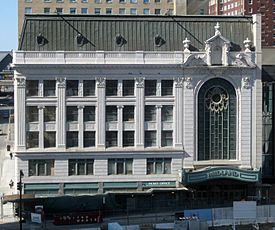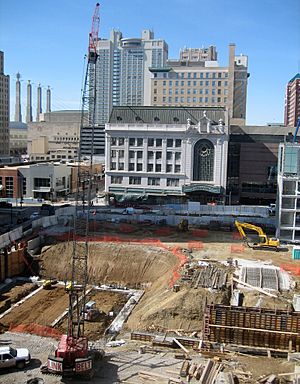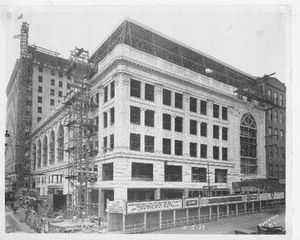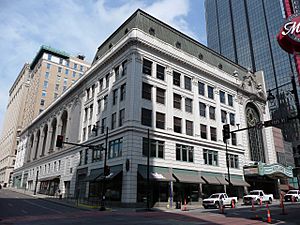Midland Theatre facts for kids
|
Loew's Midland Theatre (1927–61)
Midland Stadium (1961–62) Saxon Theatre (1962–66) Midland 1-2-3 Theatre (1966–77) Midland Theatre (1977–2008) The Midland by AMC (2008–13) Arvest Bank Theatre at The Midland (2013 - 2022) |
|

Facade of theatre, 2007
|
|
| Address | 1228 Main Street Kansas City, Missouri United States |
|---|---|
| Owner | The Cordish Company |
| Operator | AEG Presents |
| Capacity | 3,200 (2008–present) 3,573 (original) |
| Construction | |
| Opened | October 27, 1927 |
| Rebuilt | 1961, 1988, 1998, 2008 |
| Architect | Robert O. Boller Thomas W. Lamb |
|
Loew's Midland Theater-Midland Building
|
|
| NRHP reference No. | 77000808 |
| Added to NRHP | September 28, 1977 |
The Midland Theatre is a famous building in Kansas City, Missouri, United States. It is a large theater with about 3,000 seats. You can find it in the city's Power & Light District.
When it first opened in 1927, it was called the Loew's Midland Theatre. Over the years, its name changed several times. Some of its past names include Saxon Theatre and Midland Stadium. It was also known as The Midland by AMC and Arvest Bank Theatre at The Midland.
Contents
Building the Midland Theatre
The Midland Theatre was built by Marcus Loew. It was finished in 1927 and cost about $4 million. At the time, it was the biggest historic theater within 250 miles of Kansas City.
The theater was designed by two groups of architects. Thomas W. Lamb from New York and the Boller Brothers from Kansas City worked together. The building itself was put up by Boaz-Kiel Construction from St. Louis. The Midland was built in a beautiful style called French and Italian Baroque. This style was popular in Lamb's designs during the late 1920s.
Amazing Design Features
The outside of the theater looks like a Renaissance Revival building. It is made of cream-colored terra cotta bricks. These bricks are decorated with many interesting shapes. You can see winged figures, leaves, flowers, and arches. A large, four-story arched window sits above a special copper and gold sign. This sign, called a marquee, used to have 3,600 light bulbs!
Inside, the theater is even more stunning. It has over 500,000 feet of gold leaf, which is very thin gold. There are also five huge Czechoslovak crystal chandeliers. These chandeliers were cut by hand and are very valuable. The theater also has many unique art objects and old antiques. The wood and plaster work inside is truly spectacular.
When the Loew's Midland first opened, it had a special Robert Morton pipe organ. This organ was used for live music during shows. After World War II, movies with sound became more popular. Because of this, live stage shows and organ music were no longer needed. The organ was later moved to the Kansas City Music Hall.
Changes Over the Years
In January 1961, the Midland Theatre closed for a short time. After some changes, it reopened as an arena. It became the home for Kansas City's professional bowling team, the Kansas City Stars. However, the bowling team did not do well financially. They left the Midland in December of the same year.
AMC Takes Over
AMC Theatres bought the Midland in 1966. At that time, AMC was a smaller movie theater chain in the Kansas City area. The Midland continued to show movies until 1981. For a while, it was part of a movie complex called the AMC Midland-Empire.
Since then, the Midland has become a place for live performances. It hosts many different events today. You can see concerts, Broadway shows, ballet, and other stage performances. The theater was added to the National Register of Historic Places in 1977. This means it is recognized as an important historic building.
Modern Updates and New Names

In 2007, two companies, AEG Live and the Cordish Company, worked together. They started a big project to update the historic Midland Theatre. It cost millions of dollars to renovate the building. When it reopened in late 2008, it was called "The Midland by AMC." It hosted many events promoted by AEG Presents.
During the renovation, some major changes were made. The seats on the main floor were removed. They were replaced with an open area that has different levels. This new design allows for tables and chairs, or standing room for general admission events. The old sign outside, the marquee, was also restored to look like it did in 1927. The five floors of offices facing Main Street were turned into bars, lounges, and office spaces. All these changes followed rules for preserving historic buildings.
On September 4, 2013, the theater got a new name. AEG Live, the Cordish Company, and Arvest Bank announced a partnership. Arvest Bank bought the rights to have its name on the theater. So, on September 13, 2013, the venue officially became the Arvest Bank Theatre at The Midland.
See also
 | Calvin Brent |
 | Walter T. Bailey |
 | Martha Cassell Thompson |
 | Alberta Jeannette Cassell |



